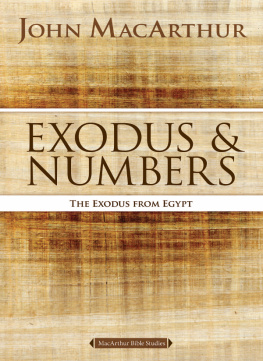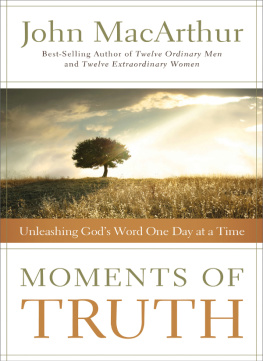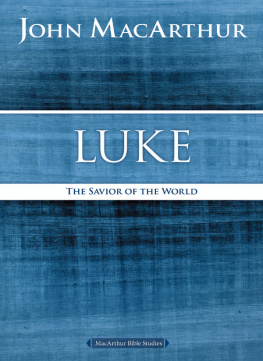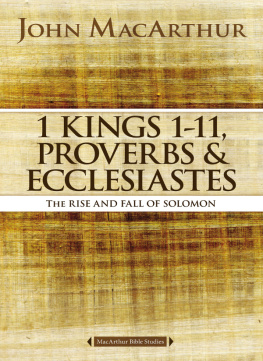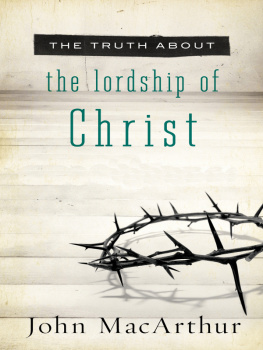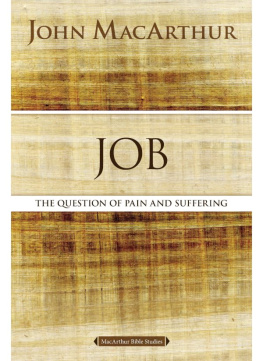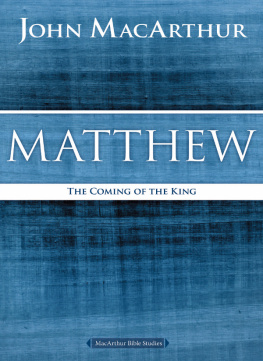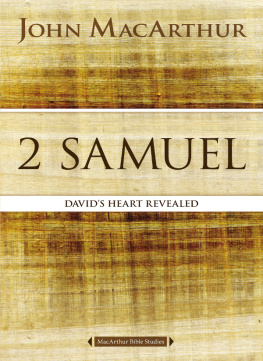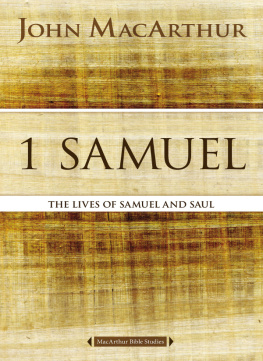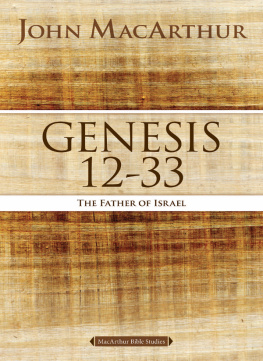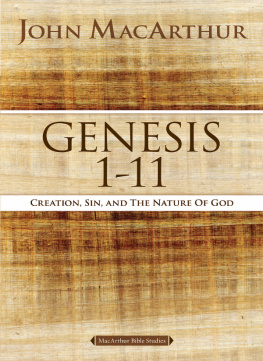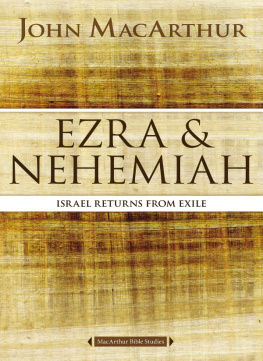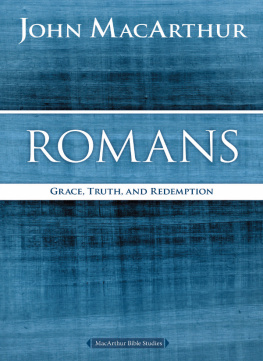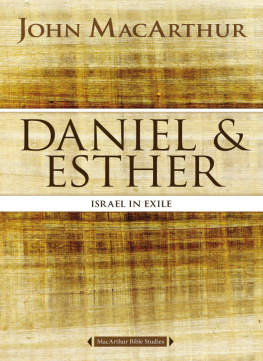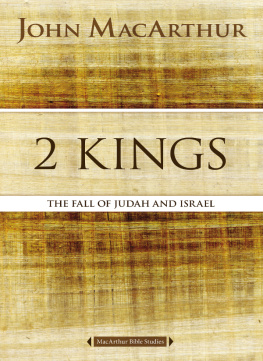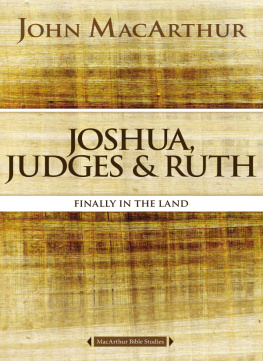MacArthur Bible Studies
Exodus & Numbers: The Exodus from Egypt
2008 by John MacArthur
Originally published as The Exodus From Egypt: Moses and Gods Mercy.
All rights reserved. No portion of this book may be reproduced, stored in a retrieval system, or transmitted in any form or by any meanselectronic, mechanical, photocopy, recording, scanning, or otherexcept for brief quotations in critical reviews or articles, without the prior written permission of the publisher.
Published in Nashville, Tennessee, by Nelson Books, an imprint of Thomas Nelson. Nelson Books and Thomas Nelson are registered trademarks of HarperCollins Christian Publishing, Inc.
Originally published in association with the literary agency of Wolgemuth & Associates, Inc. Original layout, design, and writing assistance by Gregory C. Benoit Publishing, Old Mystic, Connecticut.
Unleashing Gods Truth, One Verse at a Time is a trademark of Grace to You. All rights reserved.
Thomas Nelson titles may be purchased in bulk for educational, business, fundraising, or sales promotional use. For information, please e-mail SpecialMarkets@ThomasNelson.com.
Scripture quotations are taken from The New King James Version. 1982 by Thomas Nelson. Used by permission. All rights reserved.
Some material from the Introduction, Keys to the Text and Exploring the Meaning sections taken from The MacArthur Bible Commentary, John MacArthur. Copyright 2005 Thomas Nelson Publishers.
ISBN 978-0-7180-3470-2
ISBN 978-0-7180-3485-6 (eBook)
CONTENTS
A t the end of the book of Genesis, Joseph led his family to settle in the rich lands of Goshen in Egypt to escape the great famine that was plaguing all the land (see Genesis 47). The Israelites originally settled there as guests of the king, but over time their growing numbers made the Egyptians concerned that in the event of war they would rise up against them. So they made the Hebrew people their slaves.
The Israelites remained in this state for most of the 430 years they spent in Egypt. However, the Lord had promised Abraham that his descendants would one day be led out of their slavery and back into the land of Canaan. Our studies begin when that time had finally arrived. The Lord began guiding His people out of Egypt by selecting a man to lead them: Moses, one of the most humble men in Scripture.
During their travels toward Canaan, the people of Israel witnessed the power and faithfulness of God in countless ways. He went with them physically in a pillar of cloud by day and a pillar of fire by night. He met with Moses face to face on Mount Sinai. He provided food and water and delivered the people from the most deadly army on earth. Yet despite all these miracles (and many more), the people of Israel constantly grumbled and complained against God and Moses.
In these twelve studies, we will examine the biblical events depicted in the books of Exodus and Numbers. We will examine Gods calling of Moses, the ten plagues He sent against Egypt, the Ten Commandments He gave to the people, the miraculous provisions He brought in the wilderness, and much more. We will also learn some precious truths about the character of God and see His great faithfulness in keeping His promises. We will learn, in short, what it means to walk by faith.
THE BOOK OF EXODUS
The book of Exodus was so named in the Septuagint (the Greek translation of the Bible) and the Latin Vulgate of the Old Testament because the departure of Israel from Egypt is the dominant historical fact of the book. In the Hebrew Bible, the opening words, And (or now) these are the names, served as the title of the book. The opening and or now in the Hebrew title suggests the book was to be accepted as the obvious sequel to Genesis, the first book of Moses. Hebrews 11:22 commends the faith of Joseph who, while on his deathbed (c. 1804 BC), spoke of the departure or the exiting of the sons of Israel, looking ahead more than 350 years to the exodus.
AUTHOR
Mosaic authorship of Exodus is affirmed in Scripture. Moses followed Gods instructions and wrote all the words of the LORD (24:4), which included the record of the battle with Amalek (17:14), the Ten Commandments (34:4, 2729), and the Book of the Covenant (20:2223:33). Similar assertions of Mosaic writing occur elsewhere in the Pentateuch, and the Old Testament corroborates Mosaic authorship of the portions mentioned above. The New Testament concurs by (1) citing Exodus 3:6 as part of the book of Moses (Mark 12:26), (2) assigning Exodus 13:2 to the law of Moses, which is also referred to as the law of the Lord (Luke 2:2223), (3) ascribing Exodus 20:12 and 21:17 to Moses (Mark 7:10), (4) attributing the law to Moses (John 7:19; Romans 10:5), and (5) by Jesus specifically declaring that Moses had written of Him (John 5:4647).
DATE
Moses wrote Exodus sometime after the Israelites departure from Egypt but obviously before his death on Mount Nebo. Scripture dates Solomons fourth year of reign (c. 965 BC) as being 480 years after the exodus (see 1 Kings 6:1), thus establishing the date of 1445 BC for the exodus. The judge Jephthah also noted that by his day, Israel had possessed Heshbon for 300 years (see Judges 11:26). Calculating backward and forward from Jephthahand taking into account different periods of foreign oppression, judgeships and kingships, the wilderness wanderings, and the initial entry and conquest of Canaanamounts to 480 years and confirms the date of 1445 BC.
BACKGROUND AND SETTING
Moses, born in 1525 BC, spent the first forty years of his life in the courts of Pharaohs Thutmose I and II and Queen Hatshepsut. He spent the next forty years in self-imposed exile during the reign of Thutmose III, before returning to be Israels leader early during the reign of Amenhotep II, the pharaoh of the exodus. God used both the educational system of Egypt and Moses exile in Midian to prepare him to guide the Israelites through the wilderness of the Sinai Peninsula during his final forty years. Moses died on Mount Nebo when he was 120 years old, and though he looked on the Promised Land from afar, he never entered it. Centuries later, he appeared to the disciples on the Mount of Transfiguration (see Matthew 17:3).
HISTORICAL AND THEOLOGICAL THEMES
The exodus marked the beginning of the fulfillment of Gods covenant promise to Abraham that his descendants would not only reside in the Promised Land but also multiply and become a great nation (see Genesis 12:13, 7). The book traces the rapid growth of Jacobs descendants from Egypt to the establishment of the theocratic nation in their Promised Land. It also recounts how at appropriate times, such as on Mount Sinai and in the plains of Moab, God gave the Israelites a body of legislation (the Law), which they needed in order to live in Israel as His people. By this, they were distinct from other nations. Through Gods self-revelation, the Israelites were instructed in the sovereignty and majesty, the goodness and holiness, and the grace and mercy of their Lord, the one and only God of heaven and earth.
INTERPRETIVE CHALLENGES
The absence of any Egyptian record of the devastation of Egypt by the ten plagues and the major defeat of Pharaohs army at the Red Sea should not give rise to speculation on whether the account is authentic. Egyptian historiography did not permit records of their pharaohs embarrassments and ignominious defeats to be published. In addition, despite the absence of extra-biblical records of the Hebrew bondage, the plagues, the exodus, and the conquest, the archeological evidence corroborates the early date. All pharaohs of the fifteenth century left evidence of interest in building enterprises in Lower Egypt, and these projects were accessible to Moses in the region near Goshen.
The typological significance of the tabernacle has occasioned much reflection. Ingenuity in linking every item of furniture and every piece of building material to Christ may appear most intriguing; however, if New Testament statements and allusions do not support such linkage and typology, hermeneutical caution must rule. The tabernacles structure and ornamentation for efficiency and beauty is one thing, but finding hidden meaning and symbolism is unfounded. How the sacrificial and worship system of the tabernacle and its parts typify the redeeming work of the coming Messiah must be left to those New Testament passages that treat the subject.
Next page
